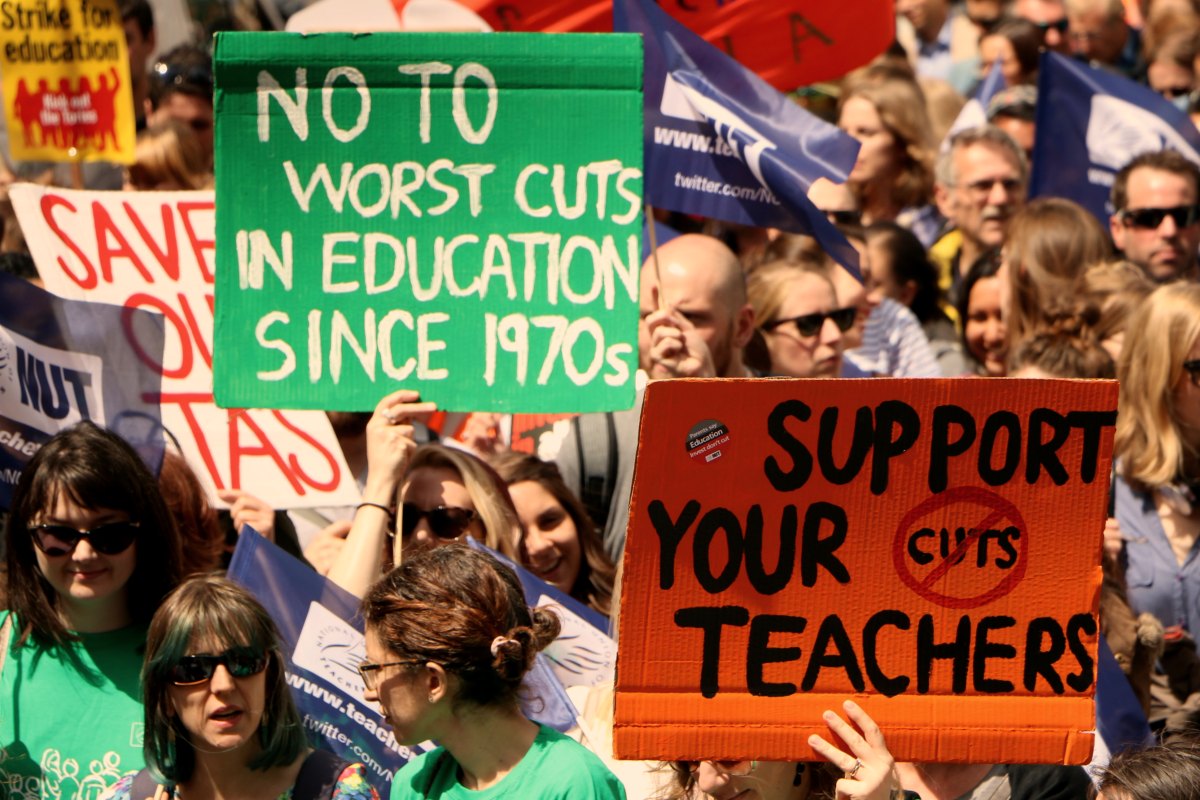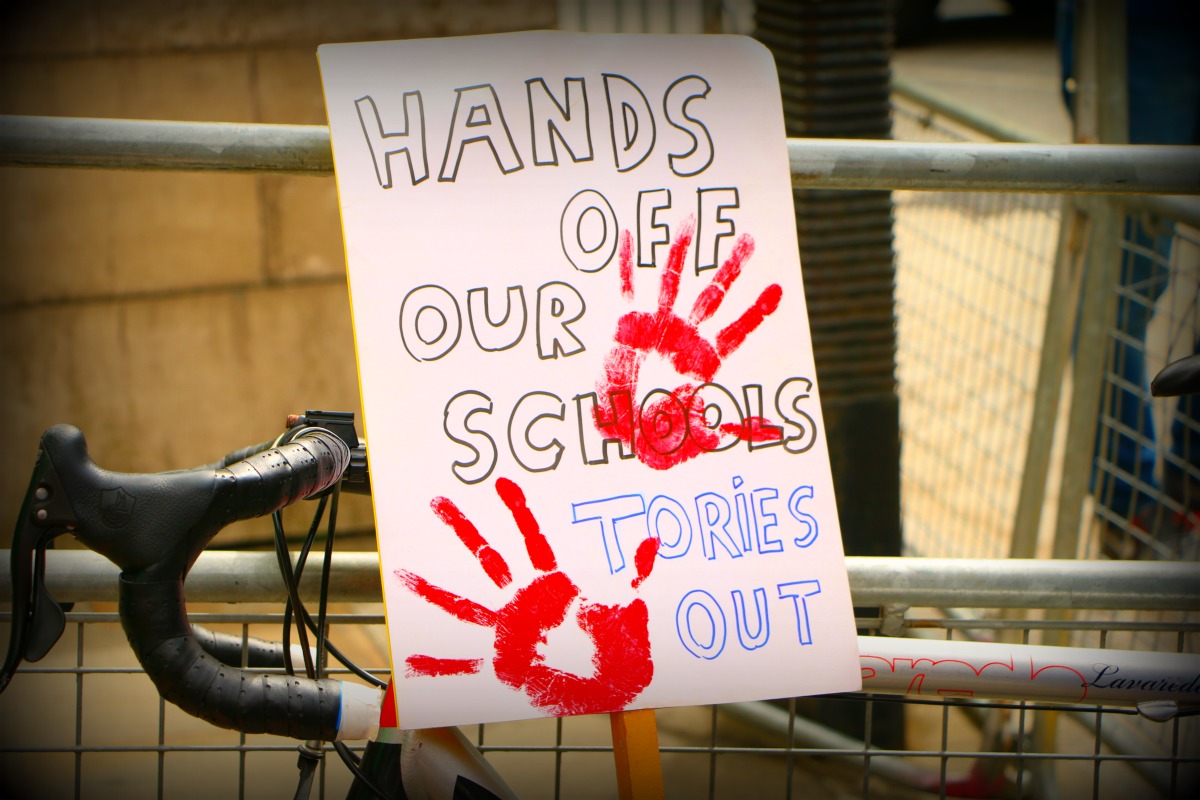With schools and teachers facing a barrage of cuts and attacks, this year’s conference of the National Education Union saw impassioned debates over a range of issues. The task for left activists is to mobilise members for a militant fightback.
Standing ovations, tears, celebrations, and walkouts were all on display at the first in-person conference of the National Education Union (NEU) since 2019.
This year’s conference took place against a backdrop of intensifying industrial struggle all over Britain, as the Tories and bosses look to make workers pay for the crisis of capitalism.
The NEU is gearing up for a fight. Teachers’ wages are down by 17% over the last decade. We face an average working week of 54 hours. And we have a government whose recent education white paper aims to ensure that all schools are in multi-academy trusts by 2030.
No wonder that 44% of teachers are planning to leave the profession in the next five years.
Twelve years of Tory government have shown that the capitalists cannot be trusted with our education. There is no choice but to fight back.
Pay campaign

This conclusion was clearly drawn by delegates in Bournemouth, with conference unanimously committing to campaign for a national industrial ballot as part of the NEU’s struggle for at least an 8% pay rise.
Throughout the conference there was tense and emotional debate on calling further industrial ballots, however, with three other motions on school funding, a national contract, and testing all pushing for nationwide strike action.
But the leadership, under the control of the NEU Left, made their position clear regarding the union’s priorities: fight for pay first, then conditions afterwards.
Even when important issues such as organising support staff (teaching assistants, cleaners, caterers, technicians, etc.) arose, these were placed on the back burner, so as to avoid a clash with other trade unions in the run-up to a national pay campaign.
Every one of these votes was close; only defeated due to members placing their faith in the leadership’s tactics.
The result is that there are now enormous expectations surrounding the union’s pay campaign. Any backsliding in this battle will incur the wrath of the membership, who have agreed to delay all other national struggles in order to ensure victory over the question of pay.
The situation is paralleled in the Scottish teachers’ union, the EIS (Educational Institute of Scotland), whose leadership has called for members to accept a paltry 2.2% pay offer, on the basis of fighting for a 10% increase in October.
The union must now mobilise all forces to the point of attack, galvanising activists with a bold, determined, energetic campaign to ensure success in the strike ballot over pay.
A victory in this struggle, in turn, would give grassroots members confidence to go on the offensive against all the other Tory attacks on education.
Walkout
 Over a decade of Tory rule has provoked a burning anger amongst teachers.
Over a decade of Tory rule has provoked a burning anger amongst teachers.
Speaker after speaker at this year’s conference denounced the government’s policies on everything from: overly prescriptive pedagogy; the effects of high-stake testing; academisation; exclusions; the immense poverty within so-called ‘left behind’ communities; the treatment of children with disabilities; and the Tories’ continued support for Ofsted, a body which turned thirty this year.
Demonstrating the fighting spirit in the union, it was announced from the conference floor that strike action would be breaking out at the John Fisher School in Croydon, after the Archdiocese of Southwark sacked the school’s governors for supporting teachers’ decision to invite a gay author to speak.
On the question of Ofsted, it appears that Keir Starmer’s shadow education secretary, Bridget Phillipson, might have missed the memo when she was invited to speak to NEU members at conference.
Just moments after delegates had voted for the union to campaign to abolish Ofsted, Phillipson made a speech in its defence – in direct contradiction to Labour’s 2019 election manifesto.
In response, around a fifth of delegates walked out in protest, chanting “say it loud, say it clear, Ofsted is not welcome here!”
This was the first time a Labour MP has been heckled at an education union conference since the days of Blair’s New Labour government: a clear indication of what Starmer thinks of teachers and the unions, and of what they think of him.
The moment #NEU2022 delegates walked out in disgust of @bphillipsonMP‘s defence of OFSTED when we almost unanimously voted for its abolition@Keir_Starmer‘s #LabourParty doesn’t listen to workers! pic.twitter.com/foBkFUGM5L
— NEU Marxists (@NEUMarxists) April 12, 2022
By contrast, only a few days earlier, Jeremy Corbyn – alongside the presidents of the PCS and RMT unions – spoke to a packed room of over two hundred at the NEU Left’s fringe meeting.
Instead of facing heckles and walkouts, the former Labour leader was met with standing ovations and cries of “Oh, Jeremy Corbyn”, as he and his fellow panellists called for widespread strike action in defence of workers’ jobs, pay, and conditions.
Racist policing
Discussions were not restricted to issues within the classroom, however. Delegates also expressed teachers’ immense anger over the climate crisis, conversion therapy, the treatment of female prisoners, the suffering of Palestinians, the horrors of the Cuban blockade, and the Tories’ hostile environment towards refugees.
The question of racism and the police, meanwhile, saw some of the most impassioned speeches.
Coming on the back of the recent scandal surrounding the treatment of Child Q, and just two years since Black Lives Matter protests exploded onto Britain’s streets, it was clear at conference that workers’ consciousness has been transformed regarding the role of the police.
Delegates decried the school-to-prison pipeline that exists inside inner-city schools. Poverty and systemic racism have unleashed horrific conditions on black and Asian communities. To address this, more social workers, teachers, and youth services are needed. Instead, the state has responded with ever-increasing police repression.
The case of Child Q was not a one off, but the result of the rampant police presence inside inner-city schools. In response, NEU conference called for a complete opposition to police in schools.
War and peace

A number of bold positions were taken at conference thanks to campaigning by the NEU Left, which is heavily represented within the union’s leadership.
The political weakness of the leadership was revealed, however, on the question of war.
Their emergency motion on the Ukraine war had three pillars: opposition to Putin’s invasion; solidarity with the people of Ukraine; and an end to NATO expansion. But it was intentionally steeped in pacifism, calling for utopian peace talks between the imperialist powers.
Some delegates suggested a sharper stance: criticising the UK’s backing for fascist militias in Ukraine; denouncing NATO for sowing the seeds for this war through its aggressive expansion; and highlighting that Ukrainian workers would not be protected by Western imperialism. But the left leaders were unconvinced, imploring delegates to stick to a pacifist line.
As a result, rather than drawing out key class questions, the debate was reduced to the left making abstract calls for peace, whilst the right wing called for more guns and ammunition. Ultimately, all sides were voted down, leaving the NEU – unfortunately – without any position at all on the biggest conflict in generations.
Neither pacifism nor patriotism offers any solution for the working class. Instead, the task of the left and the labour movement in Britain is to deal with our own ruling class; to cut through their lies, propaganda, and hypocrisy; and to expose the cynical imperialist interests that motivate their actions. Our main enemy is at home.
Socialist alternative
 NEU Marxists – supporters of Socialist Appeal inside the union – were also present in Bournemouth, with several delegates on the conference floor, and a fringe meeting discussing the lessons from teachers’ struggles across the world.
NEU Marxists – supporters of Socialist Appeal inside the union – were also present in Bournemouth, with several delegates on the conference floor, and a fringe meeting discussing the lessons from teachers’ struggles across the world.
Speakers from the USA and Iran spoke about the inspiring movements and strikes by teachers in these countries. These point the way forward for workers in Britain and internationally.
Everywhere we look, the capitalist class and its political representatives are attacking education and other public services, as they seek to place the burden for the crisis of their system onto the shoulders of the working class.
But teachers, alongside other layers of workers, are getting organised and fighting back. What is needed is a militant leadership, armed with a bold socialist programme, to offer a clear alternative to the dead end of capitalism.






